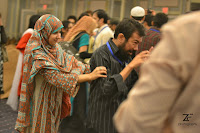Theory of relativity: ‘Everyone has disabilities, just not the same kind’
Published: March 25, 2012
The session trainer asked the audience to hug or shake hands with the person next to them. Ester Jane is hugged by the participant sitting next to her. PHOTO: AYESHA MIR/EXPRESS
KARACHI:
To help create a central support system and to give young people with special needs a platform, the first Pakistan Blind Youth Conference was organized by the Visionary Foundation of Pakistan at Regent Plaza Hotel earlier this week.Despite the nonchalance of government officials and social organizations in showing support for the event, the conference did set a milestone by trying to bridge the gap between physically privileged and challenged people.
Besides young people and those with challenges, it was attended by a number of professional trainers and speakers who held the day-long proceedings. The events included workshops, discussions and training sessions.
The conference was initially supposed to be three days long but the organizers had condense it because no government department and not enough organizations were willing to sponsor or be partners.
The chief executive officer of the foundation, Rashid Mahmood Khan, was quite candid in sharing his experience. “I regret that we did not receive enough support from the government and community. Although we had to take loans, we managed to pull off the event anyway,” he said. “It is unfortunate that the people think it is enough only to donate money to organizations working for disabled people. But people back off when it comes to opportunities that may help develop an inclusive society.”
Yet, Khan appeared hopeful that if these events are held regularly then they will finally be able to change the behavior of a society and the government towards people with different needs.
A participant of the conference, Muhammad Sarmad, agreed. “Today I have actually learned that there is no difference in the abilities and skills of the able-bodied and the so-called disabled,” he said. “Our society tends to make assumptions about people who are apparently disabled in any way without considering the fact that we are all disabled in different ways.”
Another participant, Mehreen Ali, also endorsed these views. She thought that people with disabilities were more able in many respects because they were the ones who actually knew how to live with the difficulties of life. Visually challenged Salman Elahi, who is also a PhD student in sociology, commented that the visually challenged and people with unimpaired eyesight should find ways to work together to develop an inclusive and barrier-free society. “We [people with challenges] have made a false perception of being inferior to [other] people,” said Elahi, adding that this perception keeps people with physical challenges from proving themselves in front of the world.
Another visually challenged participant, Ester Jane, works on removing false perceptions about people with special needs. She teaches at the Government Special Education Complex and never misses any event to promote her cause whether big or small. Jane has even visited other countries to try and learn as much as she can. “In this way, I can tell people that what I’m doing in my life, they can do it as well,” she said. Ahsan Rizvi, a certified cooperative trainer for the visually challenged people at Pratham, an Indian NGO, candidly shared that he was a pampered child till he met Jane. “She used to come to university on the bus while I used to wait for my chauffeur-driven car,” he said. “I thought if she could do everything and go everywhere despite her [challenge] then why could I, who was ‘perfectly normal’ not do the same? I have learnt a lot from Jane and still do.”
Published in The Express Tribune, March 25th, 2012.



















